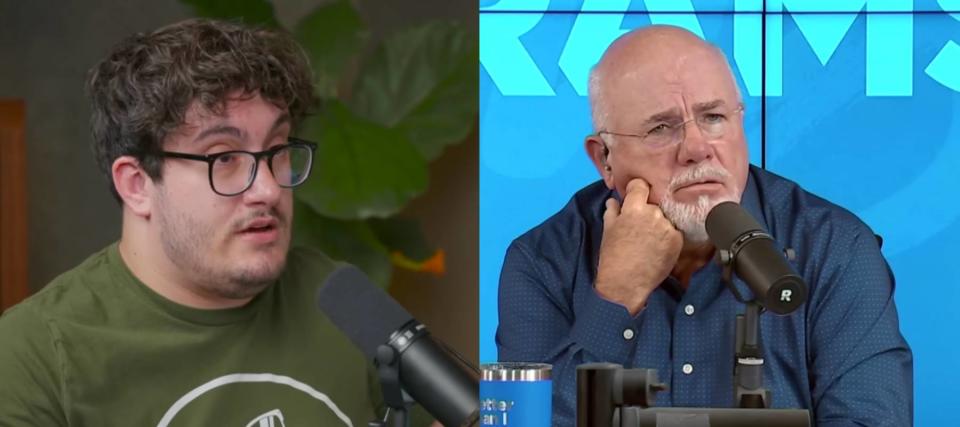Caleb Hammer says Dave Ramsey is 'clueless' when it comes to the '$1,000 emergency fund' strategy

Is Dave Ramsey clueless? Younger Americans, and some financial gurus, certainly think so.
After facing backlash for his controversial takes on retirement withdrawals, debt-free lifestyles and the cost of childcare in recent months, Ramsey came under fire again — this time from fellow personal financial guru Caleb Hammer. The topic? Emergency funds.
Don't miss
Cost-of-living in America is still out of control — use these 3 'real assets' to protect your wealth today, no matter what the US Fed does or says
Car insurance rates have spiked in the US to a stunning $2,150/year — but you can be smarter than that. Here's how you can save yourself as much as $820 annually in minutes (it's 100% free)
These 5 magic money moves will boost you up America's net worth ladder in 2024 — and you can complete each step within minutes. Here's how
Ramsey’s first step for anyone with an outstanding debt (aside from a mortgage) is to set aside $1,000 for a “starter” emergency savings account. However, Hammer thinks this isn’t sufficient.
As he noted during an episode of his YouTube series, Financial Audit, a “$1,000 emergency fund — believe it or not, Dave Ramsey — is not even close to enough money.”
He added, “Many people have come on [my] show and they did the $1,000 emergency fund and they ended up in a worse situation than they were in before — because $1,000 is not enough money to cover anything in this world.”
Here’s why Hammer believes people need a much wider financial safety net, even if they’re already in some type of debt.
Emergency costs
Nearly 20% of American adults revealed they couldn't cover an emergency expense over $100, according to the Federal Reserve’s Report on the Economic Well-Being of U.S. Households 2023-May 2024.
Of those who participated, 18% said the largest emergency expense they could comfortably afford — using only savings — was less than $100, while 14% could handle anywhere between $100 and $499. Only 10% could handle $500 to $999.
The purpose of an emergency fund is to serve as a safety net in case of an unexpected cost, be it a sudden essential home repair or medical situation.
However, $1,000 is likely inadequate for most emergencies. The average cost of auto repairs, for example, could range anywhere between $500 for a minor incident to $10,000 or more for a major accident, according to AAA.
Meanwhile, the average cost of a trip to the hospital is $2,600, without insurance, according to UnitedHealthcare.
Even with insurance, $1,000 may not be enough. The average deductible among covered employees in a plan with a general annual deductible is $1,735 for single coverage, according to the Kaiser Family Foundation’s 2023 Employer Health Benefits Survey.
With this in mind, Hammer believes people should set aside the “highest deductible” on their health insurance plan. This is a more robust safety net for most Americans.
Read more: Thanks to Jeff Bezos, you can now use $100 to cash in on prime real estate — without the headache of being a landlord. Here's how
Monthly essentials
Another situation worth factoring into your emergency fund is a sudden loss of income.
A robust emergency fund should be able to support the costs of basic necessities if you or your partner lost their job unexpectedly. However, the rising cost of living has raised the bar for this safety net.
As of June 2024, a typical one-bedroom rental in America came in at $1,526, while a two-bedroom goes for $1,900, according to Zumper’s rent index. That means a $1,000 emergency fund wouldn’t even cover the cost of housing for a full month in many parts of the country.
It would also barely cover the cost of groceries for a household. On average, a family of four, including two children between the ages of 9 and 11, could spend an average of $1,074 to $1,635 on groceries for a month, according to data from the U.S. Department of Agriculture.
This is why Hammer recommends setting aside enough money to cover basic necessities for at least one full month — taking into account housing, food, and utilities. However, many financial experts recommend having three to six months of savings stashed away for more financial security, especially if you’re living paycheck to paycheck.
What to read next
‘No turning back’: This Wall Street bear is predicting the biggest market crash since 1929 — Here’s how to prepare your portfolio if he’s right
Car insurance premiums in America are through the roof — and only getting worse. But 5 minutes could have you paying as little as $29/month
'You didn't want to risk it': 80-year-old woman from South Carolina is looking for the safest place for her family's $250,000 savings. Here's Dave Ramsey's response
This article provides information only and should not be construed as advice. It is provided without warranty of any kind.